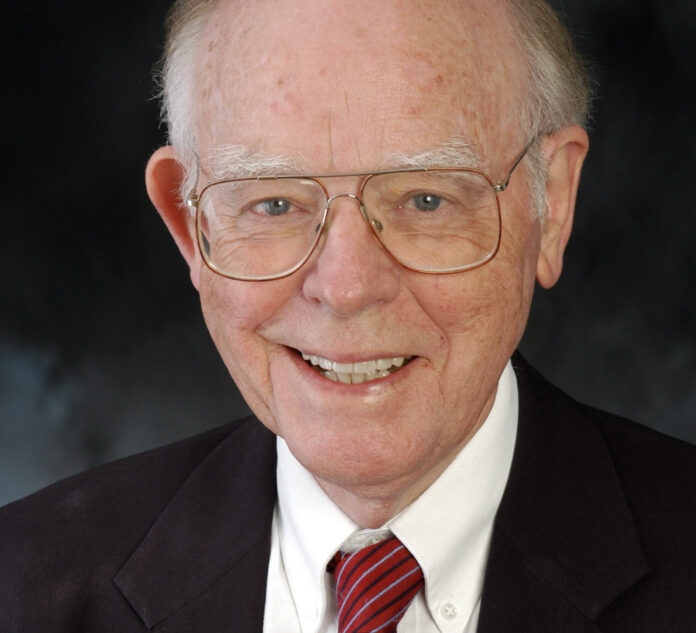Editor’s note: This profile of Don Woodard Sr. was published in the Fort Worth Business Press in August of 2004. We are republishing it now as a tribute to Woodard, who died Sept. 18.
Don Woodard’s office, in a tower on University Drive, has a huge window overlooking I-30, the Trinity River and downtown Fort Worth. He’ll eagerly point out a building or a landmark and recount the history of it to anyone who drops by.
The window serves as a lookout point for the 78-year-old insurance executive, political activist and author, allowing him to keep an eye on the city, which he says is the most beautiful place on Earth.
Woodard has been a part of the Texas political landscape for decades. He was a delegate to the Democratic National Convention that nominated John F. Kennedy in 1960, ran for the Texas Senate in 1964 and ran for mayor of Fort Worth in 1982. The Texas Senate even extended a proclamation in honor of his 70th birthday, which was celebrated at a party attended by a large chunk of Fort Worth’s political and business community.
A self-described “yellow-dog Democrat,” Woodard said he became interested in politics at the beginning of World War II, when he was still in school. Keeping up with current events was a hobby that intensified during his service in the Navy during the last years of the war. He remembers with fondness the days when Republicans in Tarrant County could be counted on one hand.
“I was the chairman of the Democrats for Eisenhower in Tarrant County in 1952 and in 1956,” he said. “I knew every precinct chairman in the county. There were no Republicans. All the conservative Democrats have gone over to the Republican party. I’m the last of the Mohicans.”
Woodard knows everyone, and everyone knows him. And he invites just about everyone he meets – regardless of political affiliation or philosophy – to his weekly Friends in High Places breakfast meetings at the Petroleum Club. The Monday-morning gatherings give voice to one of his favorite quotes from Mark Twain: “It were not best that we should all think alike.”
He remembers people he has met no matter how long it’s been since he last saw them. He knows the birthdays of all his friends, and relates them to historical events. In the course of a year, he sends out about 1,500 birthday cards accompanied by a selection of favorite quotes and headlines, as well as a “lucky” coin.
In past years, the coin was always a Susan B. Anthony dollar – “the most beautiful coin I’ve ever seen,” Woodard calls it – but the silver-colored dollars are hard to find nowadays so Woodard often encloses the more contemporary “golden dollar” that features a likeness of the Lewis and Clark trail guide, Sacagawea.
“It’s amazing; if he meets you once, he knows you forever,” said Harold Farris, who attended Friends in High Places for the first time in July. “We met once, years ago, at Colonial Country Club.”
Everyone who attends has a certain reverence for Woodard; when he walks into the room there is a scramble to say hello and shake his hand. He has a story or quip for every situation and keeps the room in laughter throughout the meeting. The club’s creed, he says, is “Don’t say anything if it is not calculated to irritate somebody else” – and he follows the rule to the letter.
During one meeting, when Marine Col. Mant C. Hawkins spoke about international military “hot spots,” Woodard asked him why he didn’t mention the Fort Worth City Council meetings. Teasing council member Clyde Picht about controversial tax abatements, Woodard asked if he could lease his home to the city to avoid paying property taxes.
“I don’t agree with him all the time, but on city issues we agree more often than not,” Picht said. “We’re still good friends and I think we have a mutual admiration for each other for speaking out on issues and speaking with conviction.
“He doesn’t just talk about stuff to get headlines – it’s because he really feels that way. That’s why we have a friendship that can endure. With a lot of people, you get into a discussion on politics and they’ll get offended. Don is never offended.”
Woodard keeps Fort Worth residents abreast of his opinions via frequent letters to the editor in the Business Press and the Star-Telegram, and he documents his views with hundreds of historical anecdotes kept in files in his office and in a special collection he donated to the University of Texas at Arlington.
“The man can say more with fewer words than just about anybody I know, and that includes professional writers,” said Paul Harral, who as Star-Telegram editorial director oversees the newspaper’s opinion pages.
Famous quotes are one of the ways Woodard expresses himself in letters, and in his daily life. He has a pedestal with a large copy of Bartlett’s Familiar Quotations displayed in his office, and while some people can recite many of the quotes in it, he can recite entire poems or speeches. Some of his favorite sources are James Russell Lowell, Omar Khayyam, William Shakespeare, Rudyard Kipling and John F. Kennedy.
Woodard often uses words written long ago to illuminate current events, especially in his many letters about the war in Iraq, which he has dubbed the “Iraqocaust.” His distaste for war is based on personal experience.
“One night, about sundown in Okinawa,” he said, “an alarm sounded aboard our ship, the USS Bowie: ‘All hands go to your battle stations!’ What came over our ship but a Japanese Kamikaze – it plowed into the battleship New Mexico off our starboard side. Great balls of fire! I’ve been to war and I know a little about what it is, so I was against making a killing field out of Iraq. I wrote a letter to the editor in February, before the March invasion, saying, ‘Don’t do it, Mr. President.’”
For Woodard, the war is the most crucial issue in this year’s presidential election but he would be supporting his party’s nominee even if President George W. Bush hadn’t invaded Iraq.
“Let’s just say I’m not an admirer of George Bush,” Woodard said.
He’s been drumming up support for Democratic candidate John Kerry and running mate John Edwards, holding meetings with fellow Democrats and encouraging friends and associates to contribute financially to the campaign. A recent rally he hosted at Colonial Country Club drew 300-400 supporters; he hopes to increase that turnout when he holds another rally Oct. 21.
“I know that Kerry can’t win Texas, but I believe we can keep Bush’s percentage well below the 60 percent he got here four years ago,” Woodard said.
Another issue that has stirred Woodard’s interest is the town lake that city officials hope to create at the confluence of the forks of the Trinity River. The proposal has incited him to write several letters to the editor and a column for the Business Press, and to purchase an ad in the Star-Telegram.
“It’s a crime in my mind what’s being done to that river,” he said. “It’s a historic confluence. Ripley Arnold stood there in 1849 and decided to build his fort there. That’s why you have the city here – because those two rivers meet. Now they want to cover up the meeting point and build a town lake and I am dead set against it. But I am a voice crying in the wilderness.”
Woodard has little use for developments that are designed to bring more people and companies to Fort Worth, which he thinks is big enough.
“We already have 600,000 people here,” he said. “What do they want? To have a million, like Dallas? I thought it was enough when it was 100,000.”
He is not only an outspoken citizen but also an avid historian. His father saved every copy of the newspaper for him while he served in World War II, and Woodard has since clipped and archived countless articles about local, national and international events. His penchant for documentation led him to write a book: “Black Diamonds! Black Gold! The Saga of Texas Pacific Coal and Oil Company.” Published in 1997, the book remains on sale in bookstores throughout the area.
Woodard was employed at Texas Pacific in 1952 as a landman and took a great interest in the town of Thurber, Texas. The company built the now-almost-empty coal-mining town, which is about 70 miles west of Fort Worth. Stories about the town are a large part of his book, and he jokes that if Fort Worth gets any bigger, he might move to Thurber.
Woodard worked for Texas Pacific until it was sold in 1963, when he became assistant to the president of Texas Electric Service Company. He remained in that position until 1972, when he started working for Southwestern Life Insurance.
In 1986, in partnership with sons Don Jr. and Blake, he founded Woodard Insurance. Don Sr. and Blake still operate the insurance business while Don Jr. runs Western Research and Management, an investment firm that has offices in the same building.
The younger Woodards’ entrepreneurial instincts emerged early in life, and their father encouraged them to develop their business skills as teenagers. When 17-year-old Don Jr.’s job selling advertising as an independent contractor for a local newspaper in the late ’70s required him to get on a plane and fly to Houston in search of clients, Dad OK’d the travel.
“It was not like we were running wild,” Don Jr. said. “We knew where the lines were. Dad has always been great about allowing us to do what we needed to do, even when we were all in business together. The great thing about Dad was that he didn’t try to force me into some pre-determined course of action that he wanted. He let me take my own course and see where it went.”
Woodard’s wife, Wanda, has shared his interest in politics. During a 10-month courtship that led to their November wedding in 1948, Wanda helped him campaign for the office of Democratic precinct chairman. Woodard pulled off a major upset in that race, unseating well-known incumbent Howard Fogg.
Wanda, who Don Woodard describes as “a veritable genius,” served as Tarrant County campaign manager for Phil Gramm when the former economics professor won election to Congress as a Democrat in 1978. The following year, Wanda managed Woodie Woods’ successful campaign for mayor of Fort Worth.
Ironically, Woods’ victory paved the way for Don Woodard’s mayoral campaign: Woods won re-election in 1981, but resigned several months later, necessitating a special election to fill the vacancy. Woodard ran against City Councilman Bob Bolen, who won the election and went on to serve as mayor until 1991.
Woodard said he was probably never meant to hold public office because “God knows what my desk looks like,” referring to the mountains of books and articles he has accumulated over the years.
Away from the office and the political arena, Woodard enjoys spending time with his four grandchildren – at least one of whom, 2-year-old Don Woodard III, has been identified by his granddad as a political ally.
“He’s a little Democrat,” Woodard said. “His other grandfather is Judge Pete Perez. Pete is my compadre, but he’s a Republican and my grandfatherly intuition tells me that Don III takes a dim view of that.”









